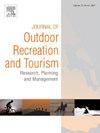以自然为基础的娱乐活动的强度是否推动了环境管理?
IF 4.4
3区 管理学
Q1 HOSPITALITY, LEISURE, SPORT & TOURISM
Journal of Outdoor Recreation and Tourism-Research Planning and Management
Pub Date : 2025-07-17
DOI:10.1016/j.jort.2025.100925
引用次数: 0
摘要
虽然以自然为基础的娱乐活动因其福利而得到广泛认可,但其在促进长期环境管理方面的作用仍未得到充分探讨。本研究通过应用严肃休闲视角(一个描述持续的、技能密集型的和建立身份的休闲参与的框架)来弥合这一差距,以研究持续参与户外活动如何培养加拿大加蒂诺公园游憩者的生态责任。使用SmartPLS结构模型,我们分析了248名户外游憩者的调查数据,评估了严肃休闲(通过严肃休闲清单和测量测量)与环境关注(使用新生态范式量表)之间的关系。重度休闲显著预测环境关注(R2 = 0.563),年轻、受过教育的参与者表现出更高的意识。环境关注的子维度——反人类中心主义(β = 0.329)、自然平衡(β = 0.771)和生态危机(β = 0.766)——受到严重休闲参与的强烈影响。研究结果通过展示严肃的休闲如何培养场所依恋和管理能力,推进了户外娱乐研究。我们为公园管理者提出了可操作的策略,以设计项目(例如,基于技能的研讨会,公民科学),利用休闲参与来实现可持续性成果。这项研究也可以用于公园管理者、环境教育者和娱乐规划者寻找基于证据的策略,通过休闲参与来鼓励可持续的行为。本文章由计算机程序翻译,如有差异,请以英文原文为准。
Does intensity of nature-based recreation drive environmental stewardship?
While nature-based recreation is widely recognized for its well-being benefits, its role in fostering long-term environmental stewardship remains underexplored. This study bridges this gap by applying the Serious Leisure Perspective a framework that describes sustained, skill-intensive, and identity-building leisure participation, to examine how sustained engagement in outdoor activities cultivates ecological responsibility among recreationists in Gatineau Park, Canada. Using SmartPLS structural modeling, we analyzed survey data from 248 outdoor recreationists, assessing relationships between serious leisure (measured via the Serious Leisure Inventory and Measure) and environmental concern (using the New Ecological Paradigm Scale).
Serious leisure significantly predicted environmental concern (R2 = 0.563), with younger, educated participants showing heightened awareness. Subdimensions of environmental concern—anti-anthropocentrism (β = 0.329), balance of nature (β = 0.771), and ecological crisis (β = 0.766)—were strongly influenced by serious leisure engagement. Findings advance outdoor recreation research by demonstrating how serious leisure fosters place attachment and stewardship. We propose actionable strategies for park managers to design programs (e.g., skill-based workshops, citizen science) that leverage leisure engagement for sustainability outcomes. This study also can be used by park managers, environmental educators, and recreation planners looking for evidence-based strategies to encourage sustainable behaviors through leisure engagement.
求助全文
通过发布文献求助,成功后即可免费获取论文全文。
去求助
来源期刊

Journal of Outdoor Recreation and Tourism-Research Planning and Management
HOSPITALITY, LEISURE, SPORT & TOURISM-
CiteScore
6.70
自引率
5.30%
发文量
84
期刊介绍:
Journal of Outdoor Recreation and Tourism offers a dedicated outlet for research relevant to social sciences and natural resources. The journal publishes peer reviewed original research on all aspects of outdoor recreation planning and management, covering the entire spectrum of settings from wilderness to urban outdoor recreation opportunities. It also focuses on new products and findings in nature based tourism and park management. JORT is an interdisciplinary and transdisciplinary journal, articles may focus on any aspect of theory, method, or concept of outdoor recreation research, planning or management, and interdisciplinary work is especially welcome, and may be of a theoretical and/or a case study nature. Depending on the topic of investigation, articles may be positioned within one academic discipline, or draw from several disciplines in an integrative manner, with overarching relevance to social sciences and natural resources. JORT is international in scope and attracts scholars from all reaches of the world to facilitate the exchange of ideas. As such, the journal enhances understanding of scientific knowledge, empirical results, and practitioners'' needs. Therefore in JORT each article is accompanied by an executive summary, written by the editors or authors, highlighting the planning and management relevant aspects of the article.
 求助内容:
求助内容: 应助结果提醒方式:
应助结果提醒方式:


